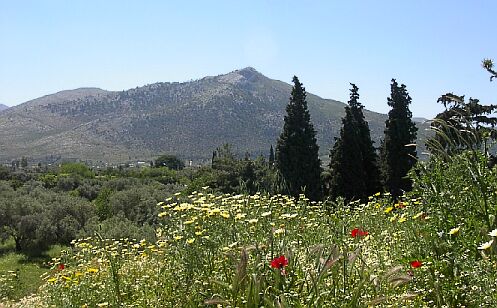READ: Aeschylus and the Oresteia
1 Aeschylus
Aeschylus is called the father of Greek drama. He is thought to have been the first person to introduce a second actor separate from the chorus. Born about 525 BC, he lived during the establishment of Democracy. He wrote over 80 plays and was "internationally" famous (visited in Sicily). He was also a warrior who fought at the battle of Marathon.
Aeschylus wrote for the theatre when it was first assuming an organized form, and therefore he is often credited with the introduction of many of its typical features such as; rich costumes and decoration of the wooden skene (set). He played to lead in many of his own plays and also designed his own choral dances. He is the first dramatist whose plays were preserved.
This is the plain of Marathon, how it looks today:

Aeschylus wrote for the theatre when it was first assuming an organized form, and therefore he is often credited with the introduction of many of its typical features such as; rich costumes and decoration of the wooden skene (set). He played to lead in many of his own plays and also designed his own choral dances. He is the first dramatist whose plays were preserved.
This is the plain of Marathon, how it looks today:

Aeschylus' plays were written in the style of ornate, long and elaborate descriptions and titles. They were often repetitious and pompous, but contained great themes that were meant to inspire patriotism and make men proud of their achievements.
He always wrote about the relationship of men to his gods. Examples of topics are: how much was a man responsible for his own actions? how far was he compelled by the will of heaven? what happens when sacred commands and human compassion conflict? These were momentous philosophical questions for the Greeks.
Important Vocabulary: Hubris - this is the consequences of human pride and failing to give the gods their due. "A successful man may take too much upon himself and go too far, but the gods are jealous of success and the man in power must walk with care." Note the difference between the Greek view of the gods and our own. They often ascribe human weakness to the gods.
Aeschylus's characters in his plays are types, rather than individuals. They personify the abstract qualities with which the moral conflict or the argument deals. Aeschylus is most famous for his three part work called the Oresteia, which consists of three plays, Agmemnon, Cheophori and Eumenides.
Source:
Aeschylus, The Oresteia, (458 B.C.).
He always wrote about the relationship of men to his gods. Examples of topics are: how much was a man responsible for his own actions? how far was he compelled by the will of heaven? what happens when sacred commands and human compassion conflict? These were momentous philosophical questions for the Greeks.
Important Vocabulary: Hubris - this is the consequences of human pride and failing to give the gods their due. "A successful man may take too much upon himself and go too far, but the gods are jealous of success and the man in power must walk with care." Note the difference between the Greek view of the gods and our own. They often ascribe human weakness to the gods.
Aeschylus's characters in his plays are types, rather than individuals. They personify the abstract qualities with which the moral conflict or the argument deals. Aeschylus is most famous for his three part work called the Oresteia, which consists of three plays, Agmemnon, Cheophori and Eumenides.
Source:
Aeschylus, The Oresteia, (458 B.C.).

